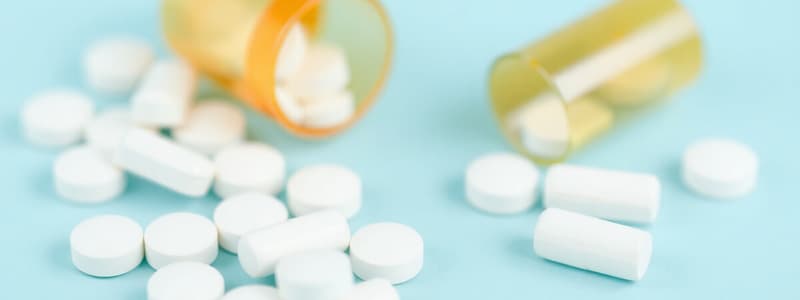Podcast
Questions and Answers
What characterizes Type I bipolar disorder?
What characterizes Type I bipolar disorder?
- Only depressive episodes
- At least one full-blown manic episode (correct)
- Hypomanic episodes without mania
- No history of manic episodes
Which symptom is associated with manic episodes in bipolar disorder?
Which symptom is associated with manic episodes in bipolar disorder?
- Low mood and worthlessness
- Racing thoughts (correct)
- Fatigue and insomnia
- Appetite changes
What type of medications are considered classic choices for treating bipolar disorder?
What type of medications are considered classic choices for treating bipolar disorder?
- Antidepressants
- Mood stabilizers (correct)
- Benzodiazepines
- Stimulants
How is unipolar depression differentiated from bipolar depression?
How is unipolar depression differentiated from bipolar depression?
What is a potential risk for patients with bipolar disorder who abuse substances?
What is a potential risk for patients with bipolar disorder who abuse substances?
Which medication is specifically indicated for treating acute mania?
Which medication is specifically indicated for treating acute mania?
What is the recommended approach for managing rapid cycling episodes?
What is the recommended approach for managing rapid cycling episodes?
Which of the following side effects is associated with Lithium use?
Which of the following side effects is associated with Lithium use?
What is a common challenge associated with the use of Lithium as a mood stabilizer?
What is a common challenge associated with the use of Lithium as a mood stabilizer?
Which anticonvulsant is known for being effective in depressive episodes?
Which anticonvulsant is known for being effective in depressive episodes?
What are atypical antipsychotics particularly effective for?
What are atypical antipsychotics particularly effective for?
What risk is associated with the use of Valproic Acid?
What risk is associated with the use of Valproic Acid?
Which benefit is associated with psychosocial treatments?
Which benefit is associated with psychosocial treatments?
Flashcards
Bipolar Disorder
Bipolar Disorder
A mental health condition characterized by alternating periods of mania (high energy, elevated mood) and depression (low energy, sadness).
Mania
Mania
A state of heightened energy, mood, and activity, often accompanied by poor judgment and recklessness.
Depression (Bipolar)
Depression (Bipolar)
A period of low mood, fatigue, and loss of interest, often accompanied by thoughts of sadness, worthlessness, and death.
Mood Stabilizers
Mood Stabilizers
Signup and view all the flashcards
Unipolar Depression
Unipolar Depression
Signup and view all the flashcards
Lithium for Mania
Lithium for Mania
Signup and view all the flashcards
Lithium Side Effects
Lithium Side Effects
Signup and view all the flashcards
Lithium Toxicity
Lithium Toxicity
Signup and view all the flashcards
Anticonvulsants for Bipolar
Anticonvulsants for Bipolar
Signup and view all the flashcards
Atypical Antipsychotics for Bipolar
Atypical Antipsychotics for Bipolar
Signup and view all the flashcards
Combination Therapy for Bipolar
Combination Therapy for Bipolar
Signup and view all the flashcards
Psychosocial Treatments for Bipolar
Psychosocial Treatments for Bipolar
Signup and view all the flashcards
Future Therapies for Bipolar
Future Therapies for Bipolar
Signup and view all the flashcards



